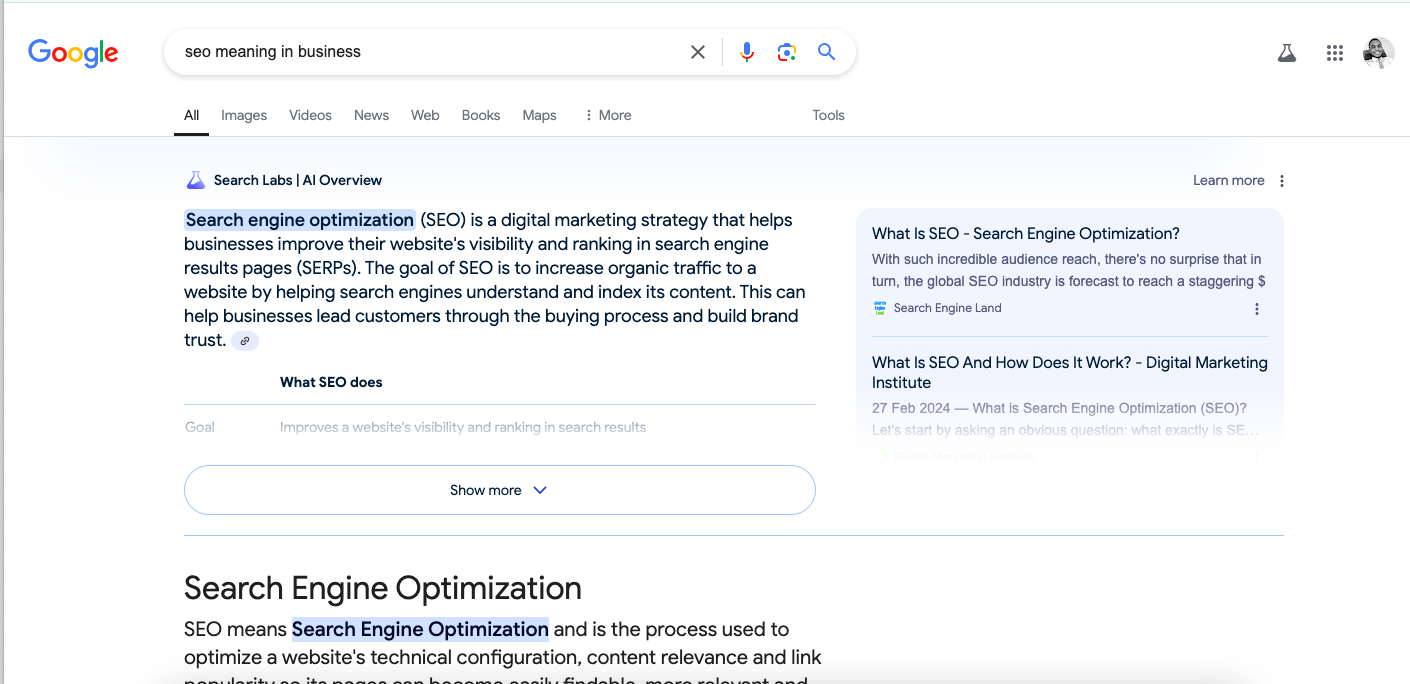weblim
June 17, 2025

Search Engine Optimization (SEO) is constantly evolving, and by 2025, we’re expecting some significant shifts.
Based on insights from years of expertise in the field, let’s dive into seven SEO predictions you need to know to stay ahead of the curve.
The first major prediction is that we will see fewer organic clicks.
Google’s constant updates, including AI-driven features and increased advertisements, are pushing traditional organic results further down the page.
Think about it: AI overviews and SERP features (Search Engine Results Page) like snippets and direct answers are designed to keep users on Google instead of clicking through to websites.
This trend will likely intensify as AI becomes more integrated into search.
While your rankings might be strong, your actual organic traffic could take a hit.
But don’t despair.
Google remains the most valuable source for organic traffic.
Compared to social platforms like X (formerly Twitter) or LinkedIn, getting clicks from Google is far more reliable.
For instance, on social media, algorithms may penalize posts with links, reducing your reach.
Google, on the other hand, still provides ample opportunities for traffic if you optimize well.
Using tools like Google Search Console, you can monitor your organic clicks and click-through rates (CTR) to ensure your SEO strategies remain on point.
AI overviews are not going away—in fact, they are expected to expand beyond informational queries to commercial and local queries.
Currently, most AI-powered summaries in search results cover long-tail informational queries.
However, as AI develops, Google will likely broaden this to cover a wider range of searches, including those with commercial intent.

If Google continues to cite sources within AI overviews, it won’t be as damaging to organic traffic as you might fear.
AI summaries are similar to featured snippets, which don’t necessarily reduce click-through rates but provide users with quick answers.
However, it’s important to note that users often choose the easiest path—meaning, they may not click through if they can get the answer straight from the AI overview, especially on mobile devices.
This could vary depending on the type of query, but understanding human behavior will help you adapt to these changes.
Google is a business, and at the end of the day, advertisers come first.
That’s why it’s highly likely that by 2025, we’ll see ads integrated into AI overviews.
You may soon be able to advertise directly in AI summaries, just like in other Google Ad formats.
This evolution makes sense as Google looks to monetize every aspect of the search experience.
SEO practitioners should prepare to integrate ads into their SEO strategies, as it will become an essential part of competing in search results.
For the first time in its long-dominant history, Google might face serious competition from other search platforms like Search GPT and Perplexity.
While we don’t know the full capabilities of these platforms yet, they could disrupt the SEO landscape, especially if they integrate well with technologies like in-chat GPT.
It’s essential not to fear this change.
SEO has always been about optimizing for various search engines, not just Google.
As these new platforms develop, SEO professionals will need to optimize for large language models (LLMs) and learn how to make content visible across different search platforms.
Understanding Natural Language Processing (NLP) will be key, as LLMs use NLP to understand and rank content.
Being adaptable will be more important than ever as new competitors challenge Google’s dominance.
Despite the rise of alternative search engines, Google will still dominate with more than 85% of the search market by 2025.
While competitors like Search GPT may offer viable alternatives, Google isn’t going down without a fight.
With nearly unlimited resources, Google will continue to improve its search capabilities and stay ahead of competitors.
As an SEO professional, this means you should continue focusing on Google as your primary traffic source while keeping an eye on emerging platforms.
Content is becoming easier to create with the rise of AI tools, but that means Google needs better ways to filter through the vast amount of content generated.
Website authority—gained through backlinks, brand searches, and strong user signals—will continue to be the most important ranking factor.
Google will need a reliable way to determine which sites are trustworthy and deserving of top rankings.
To stay competitive, focus on building strong backlinks and encouraging branded searches.
Backlinks alone won’t be enough; the combination of backlinks and branded search traffic will be crucial for long-term SEO success.
According to a study by Moz, websites with high brand authority tend to perform better in search rankings and are more likely to survive Google algorithm updates.
So while everyone can create decent content, only sites with genuine authority will thrive.
SEO is evolving, and agencies will need to adapt.
In the past, many agencies focused solely on SEO, but by 2025, we’ll likely see fewer agencies that specialize in just SEO.
To thrive, SEO agencies will need to offer broader digital marketing services that include both organic and paid search strategies.
Conversion rate optimization (CRO) will also play a bigger role.
Driving traffic alone won’t be enough; agencies will need to ensure that traffic is converting into leads or sales.
In other words, the SEO agencies that survive will be the ones that take a holistic approach to search marketing, integrating SEO with paid search and CRO strategies.
2025 Weblim | All rights reserved | Terms & Conditions | Privacy Policy | Refund Policy